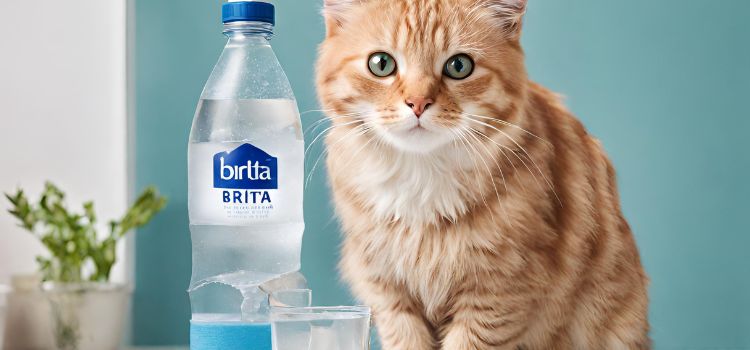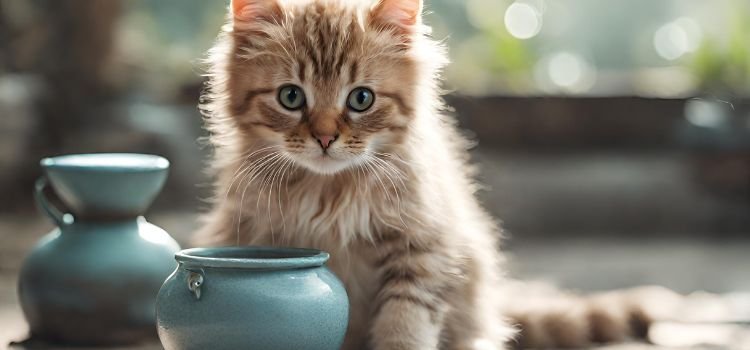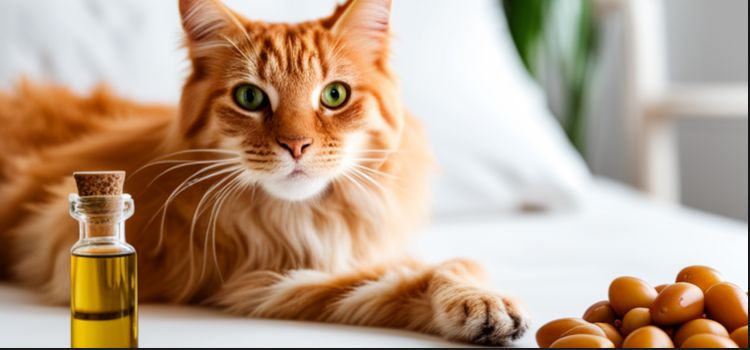As an Amazon Associate committed to the mission of improving the lives of our readers, Live-Clear.com receives a small commission from eligible purchases made through our affiliate links. This revenue enables us to keep producing insightful articles and other material.
Yes, Brita filtered water is safe for cats. Brita filters remove impurities such as chlorine and sediments from tap water.
Brita filters are an easy and affordable way to improve the quality of tap water. Many pet owners wonder if filtered water is safe for their cats. According to veterinarians, Brita filtered water is safe and can even improve the overall health of cats.

Tap water may contain impurities like chlorine, which can be harmful to cats and affect their taste preferences. Brita filters remove these impurities and provide a clean and fresh taste. However, it is essential to note that filtered water should not replace a cat’s regular intake of water. Furthermore, providing filtered water can be especially crucial if your cat is prone to urinary tract issues or other health problems. We will explore the benefits of giving your cat filtered water, how to introduce it, and answering common questions regarding its safety.
Is Brita Water Safe For Cats?
Brita filtered water is generally safe for cats to drink, as it removes impurities and chemicals from tap water. However, it is important to ensure that your cat has access to fresh water daily and that the filter is changed regularly to maintain the quality of the water.
As pet owners, we are always cautious about everything our pets consume. If you are a cat owner and wondering whether Brita filtered water is safe for your furry friend, you are not alone. Brita water filters are popular household gadgets that remove impurities from tap water, but does that make it safe for cats to consume? Let’s delve deeper and find out.
Types Of Water Safe For Cats
Before we dive into the specifics of Brita water safety for cats, let’s discuss the general types of water that are safe for feline consumption. Cats mostly prefer still, fresh, and cold water, whether it is bottled, tap, or filtered water. As long as the water is free of contaminants, clean, and fresh, it is safe for cats to drink.
How Brita Water Works
Brita water filters use a two-stage process to remove impurities from tap water. The activated carbon filter reduces the taste and odor of chlorine, copper, mercury, and cadmium commonly found in tap water. The ion exchange resin filter then reduces heavy metals, limescale, and other impurities that affect the flavor and quality of water.
Contaminants Removed By Brita Filters
Brita filters are effective in removing several contaminants from tap water, including chlorine, lead, copper, and mercury. These contaminants can affect the taste and odor of tap water and can have adverse health effects on both humans and cats. However, it is essential to note that Brita filters are not designed to remove microorganisms such as bacteria and viruses, so it is crucial to maintain good hygiene practices when using Brita water. Here is the list of contaminants that Brita filters are specifically designed to remove:
- Chlorine and Chloramine
- Copper
- Mercury
- Cadmium
- Zinc
- Particulate
Brita Water Vs. Tap Water For Cats
Brita filter can make tap water taste and smell better by removing some contaminants, but is it better than tap water for cats? Whether Brita water or tap water is safe for cats depends on the specific quality of tap water and the type of Brita filter used. If your tap water contains high levels of heavy metals or other harmful contaminants, Brita water might be safer for your cat to drink. However, if your tap water is already safe and clean, you might not need to filter it. In conclusion, Brita filtered water is safe for cats to drink, provided it is properly filtered and stored. Brita filters can remove several contaminants that can affect the quality, taste, and odor of tap water, making it a better option for cats. However, it is crucial to ensure that the water is free of any microorganisms that can pose a risk to your cat’s health.

Risks Associated With Brita Water For Cats
Brita filtered water may not always be safe for cats due to the risk of contaminants. Cats have sensitive digestive systems, and impurities in the water can result in health problems such as vomiting and diarrhea. It’s advisable to consult a veterinarian before offering Brita water to cats to ensure their safety.
If you’re a cat parent and use Brita filtered water for your feline friend, you need to be aware of the potential risks that come with it. Although Brita filter is suitable for humans, it may not be the best choice for cats due to some reasons. In this post, we will discuss the possible risks associated with Brita water for cats.
Dehydration
Using Brita filtered water for cats may lead to dehydration. The filtration process removes minerals such as potassium and sodium, which are essential for maintaining the electrolyte balance. When cats drink water low in minerals, they tend to lose fluids faster, leading to dehydration. Signs of dehydration in cats include sunken eyes, lethargy, dry gums, and poor skin elasticity.
Electrolyte Imbalance
An imbalance in electrolytes such as potassium and sodium in cats can lead to several health issues. Since the Brita filter removes these minerals, the water may not be the best choice for cats. Electrolyte imbalance can lead to muscle weakness, tremors, seizures, and cardiac arrest. It’s essential to ensure your cat is getting adequate minerals from their water source.
Digestive Issues
Cats may also experience digestive issues when drinking Brita filtered water. The filtration process does not remove all impurities, and some contaminants like magnesium can still be present. Magnesium, when ingested in large quantities, can cause diarrhea in cats. Additionally, Brita water may have a lower pH, which can upset your cat’s stomach and lead to vomiting. It’s crucial to provide clean, mineral-rich water sources for your feline friends. While Brita filter is excellent for humans, it’s not the best choice for cats.
Remember to pay attention to your cat’s behavior and monitor for any signs of dehydration, electrolyte imbalance, or digestive issues. If you notice any of these symptoms, contact your veterinarian immediately.

How To Safely Give Brita Water To Cats
Brita filtered water can be safe for cats if certain precautions are taken. First, make sure the filter is changed frequently to prevent bacterial growth. Second, monitor your cat’s water intake to ensure they are staying hydrated. Lastly, consult with a veterinarian to determine if filtered water is the best choice for your cat’s individual needs.
Cats thrive on clean and fresh water. Brita filtered water is known for its purity, and many cat owners wonder if it is safe for their feline friends. Fortunately, Brita filtered water is not only safe but also beneficial for cats. Here’s what you need to know before introducing it to your cat’s diet.
Consult With A Vet
Before making changes to your cat’s diet, it is crucial to consult your vet. Your vet can advise on the right amount of filtered water to give your cat based on their age, weight, and health status. They can also advise if Brita water is suitable for your cat depending on their specific medical condition.
Gradually Introduce Brita Water
It is essential to introduce filtered water gradually to your cat’s diet. This will allow your cat to adjust to the new taste and avoid digestive problems. Start by adding a small amount of Brita water to your cat’s regular water. Gradually increase the amount over time until your cat has completely transitioned to the filtered water.
Monitor Your Cat’s Health
After introducing filtered water to your cat’s diet, make sure to monitor their health for any changes. Observe their drinking behavior, and ensure they are taking in the right amount of water. Keep an eye out for any digestive problems or allergy symptoms. If you notice any changes in your cat’s behavior, contact your vet right away.
Brita filtered water is safe for cats, and it’s an excellent way to improve the quality of water they drink. It’s crucial to consult with your vet, introduce it gradually, and monitor your cat’s health to ensure a smooth transition. With these precautions in mind, your cat can enjoy the benefits of clean and pure water.

Alternative Water Sources For Cats
Cats are creatures of habit and prefer to drink water from sources they are familiar with. Water is important for a cat’s health, and they require clean and fresh water to stay hydrated. Filtered water is a popular choice among cat owners due to its purity and taste. But the question arises: Is Brita filtered water safe for cats?
Brita filters are designed to remove impurities and contaminants from water that can affect taste, odor, and quality. While Brita filters are safe for human consumption, there is no scientific evidence that proves they are or are not safe for cats. Due to this lack of research, it’s better to err on the side of caution and avoid giving your cat Brita filtered water.
There are various other sources of water that you can give to your cat:
Filtered Water from Pet Fountains
Pet fountains are a great investment for cats as they provide fresh, filtered water. The running water encourages your cat to drink more and also prevents water from becoming stagnant, which can attract bacteria and cause health issues. When buying a pet fountain, ensure that it’s easy to clean and maintain.
Spring Water
Spring water is a natural, mineral-rich source of water that is safe for cats to consume. It’s free of contaminants and chemicals commonly found in tap water. However, be sure to check the source of the spring water and ensure that it’s safe for consumption.
Bottled Water
Bottled water is a convenient alternative to tap water and can be easily purchased from grocery stores. However, not all bottled water is created equal. Look for bottled water that contains low levels of minerals and is free of additives that can be harmful to your cat’s health.
Providing your cat with clean and fresh water is vital for their health. Offering a variety of water sources can also encourage your cat to stay hydrated and prevent health issues related to dehydration. Before choosing a water source for your cat, ensure that it’s safe and meets their individual needs.

Conclusion
It’s important to ensure our pets’ water sources are safe and clean. After researching and analyzing the benefits and drawbacks of Brita filtered water for cats, it appears that it is indeed safe for feline consumption. While it may not be necessary for all pet owners, using a Brita filter can provide an added layer of protection against harmful substances in tap water.
Frequently Asked Questions Of Is Brita Filtered Water Safe For Cats
Cats should drink fresh, clean and filtered water. Avoid giving them unfiltered tap water as it may contain impurities such as metals and chemicals. Changing the water regularly is also important to keep it fresh and prevent the buildup of bacteria.
Yes, water filters are generally safe for cats to drink from. They help remove impurities, chemicals, and other harmful substances, ensuring that your cat drinks clean and pure water. However, it is important to regularly clean and maintain the filter to prevent the growth of bacteria or mold which could harm your cat.
Cats can drink both filtered and unfiltered water. However, filtered water is recommended as it reduces the number of impurities and harmful chemicals. But, providing clean and fresh water every day is most important for a happy and healthy feline.
Yes, it’s recommended to give animals filtered water for their safety and health. Tap water may contain harmful chemicals and minerals like chlorine, fluoride, and lead, which can be harmful to their digestive system and overall health. Filtered water removes these impurities and provides cleaner and safer water for your pets.
Yes, Brita filters remove impurities from tap water, making it safe for cats.
Ultimately, the decision to use a filter or not comes down to personal preference, but it’s always best to consult with your veterinarian for a professional opinion.
Amazon and the Amazon logo are trademarks of Amazon.com, Inc, or its affiliates.



